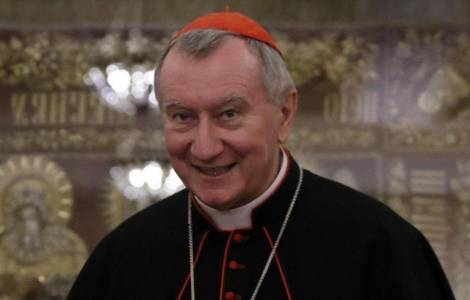
Rome (Agenzia Fides) - In the face of the war in Ukraine, "we cannot but ask ourselves whether we are doing everything, everything possible to put an end to this tragedy", said Cardinal Pietro Parolin, Secretary of State at the Vatican, at an event at the Italian Embassy to the Holy See this December 13th. The cardinal stressed that "war itself is an error and an abomination", repeating Pope Francis' call to "use all diplomatic instruments, including those that have not been used to date, to achieve a ceasefire and a just peace reach".
The cardinal secretary of state added: "In the last few weeks we have seen a glimmer of hope for a possible resumption of negotiations, but also lockdowns and the escalation of bombing" and "it is terrifying that we have returned to talk about the use of nuclear devices and atomic warfare as a possible eventuality. It is worrying that in several countries around the world, the race to rearmament has accelerated, with huge sums being spent on fighting hunger, creating jobs and ensuring adequate medical care for millions of people could be used".
Referring to the theme of the event, Cardinal Parolin called for "reviving the spirit of Helsinki and working creatively" and called for "new tools" to tackle not only the war in Ukraine but also the many forgotten wars. "We cannot envision the future based on old patterns, old military alliances, or ideological and economic colonization. We must envision and build a new concept of peace and international solidarity". "We need courage, to bet on peace and not on the inevitability of war".
"Why not go back and re-read the outcome of the Helsinki conference to take some of its fruits and put them on the table in a new form? Why not work together to have a new major European peace conference?" asked the cardinal and wished for "a stronger organized and prepared participation of European civil society, peace movements, think tanks and organizations working at all levels for peace education and dialogue".
The Conference on Security and Co-operation in Europe (CSCE) was convened for the first time on July 3, 1973 in Helsinki and was launched in the middle of the Cold War to resume the East-West dialogue: representatives of all European countries (with the exception of Albania) and envoys from the United States and the Soviet Union attended the conference.
Cardinal Parolin recalls in particular that "for the first time since the Congress of Vienna (1814-15), the Holy See took part in an international conference and advocated dialogue, mutual understanding, peace and international justice". On August 1, 1975, the heads of state and government of the 35 countries participating in the conference met again in Helsinki to sign the CSCE Final Act: These agreements or "Memoranda of Understanding" recognized, among other things, the existing borders between the European states, including the border that then divided Germany into two separate and sovereign political entities, and in return for the implicit recognition of Soviet supremacy in Eastern Europe, the USSR pledged to respect human rights. (L.M.) (Agenzia Fides, 13/12/2022)